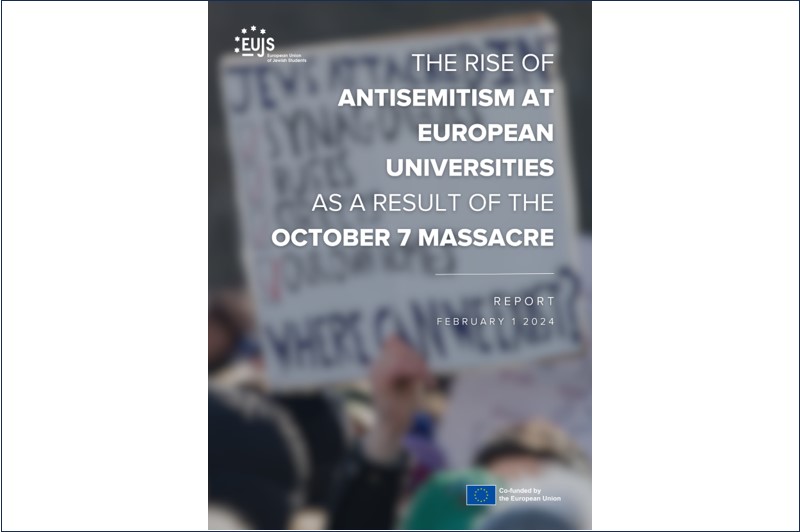EUJS has published a report on the the Rise of Antisemitism at European Universities as a result of the October 7 Massacre. For the compilation of this report, we received more than one hundred and ten (110) reports of antisemitic incidents across Europe. However, this is no way reflects the true magnitude of incidents that have taken place, as many have gone unreported.
On the morning of October 7, 2023, the terrorist organisation Hamas simultaneously
assaulted civilian communities and military posts in Israel. In an unprecedented
surprise attack on southern Israel, Hamas terrorists committed unfathomable
atrocities, including sexual violence and torture. The attacks claimed the lives of more
than 1194 individuals1
They left over 4834 people wounded and resulted in more than
243 being taken hostage.
The October 7th massacre not only escalated the Israeli-Palestinian conflict, heightening regional instability, but it also had global consequences by triggering a concerning increase in antisemitism within Jewish communities worldwide.
Since the onset of the attacks, Jewish communities worldwide have witnessed a
significant and alarming resurgence of antisemitic incidents. Directly linked to heightened tensions in the Middle East, antisemitism in Europe has radically changed Jewish life. Private properties, Jewish community centres, synagogues, and even Jewish cemeteries have become targets of vandalism and threats. The sense of fear has triggered a profound shift in behaviours, as Jewish individuals grapple with the urgent need to secure their safety: to keep a low profile and avoid dangers, Jewish people have started changing their daily routines, hiding Jewish symbols (e.g. Kippahor Star of David), and avoiding references to Israel and the Jewish community inpublic.
Concurrently with the Hamas terrorist attacks in Israel, Jewish students began encountering hostility on campuses, marked by a rising number of protests supporting Hamas terrorist activities and personal attacks on community members. The escalating tensions on campus have created a palpable sense of discomfort within the European Jewish student community. In the most severe instances, these tensions have prompted students to abandon their study programmes, led Jewish student unions to cancel events, and resulted in public harassment of Jewish students by both fellow students and members of the university staff, including professors. The incidents that occurred on campus are, arguably, a consequence of a rooted antisemitism that denies Israel’s right to exist as a Jewish State and holds the Jewish collectively accountable for any event occurring in the Middle East.
In order to monitor the situation, since October 2023, EUJS has been collecting data on antisemitic attacks that have occurred inside universities across Europe. Following the release of the initial report in November 2023, EUJS has decided to publish an updated version in January 2024, aiming to present a more comprehensive andin-depth analysis of this concerning phenomenon.
Throughout the last few decades, escalating tensions in the Middle East have often led to a rising number of antisemitic attacks occurring in Europe and around the world. The underlying misconception driving these attacks is the false belief that Jewish people are directly responsible for actions taken by the Israeli government and are more loyal to the State of Israel than to their respective national countries.
This accusation is not only untrue but also deeply antisemitic (see the “Methodology” section) and carries severe consequences for the well-being of entire Jewish communities.
Within this research, a number of recurrent themes will be touched upon. To facilitate the understanding of the antisemitic incidents reported, EUJS has compiled a list of the definitions that have been employed in our analysis of the cases.
- Zionism: Zionism is the movement for the self-determination and statehood of the Jewish people in their ancestral homeland, the land of Israel. The term is often used by non-Jewish individuals to refer to Jews. Using the term “Zionist” interchangeably with “Jew,” as seen in statements like “Zionists out of the University!”, is considered antisemitic. Also, denying the Jewish people the right to self-determination is antisemitic.
- Intifada: The Intifadas were two violent periods in the late 1980s and early 2000s, during which Palestinian terrorists claimed the lives of over 1000 Israelis through suicide attacks, bus bombings, and other deadly incidents. Calling for an Intifada is considered antisemitic, as it involves a chant specifically aimed at advocating for the killing, harm, and targeting of the lives of Jews.
- “From the River to the Sea, Palestine will be Free”: This slogan calls for a Palestinian State extending from the Jordan River to the Mediterranean Sea; this is territory that includes the State of Israel, which would mean the dismantling of the Jewish state. It is an antisemitic charge denying the Jewish right to self-determination and alludes to the idea of ethnic cleansing.
- October 7th as a form of Resistance: Referring to the October 7th terrorist attacks as “resistance” is deeply problematic, as it not only undermines but also attempts to justify the massacre of around 1200 people in Israel.






